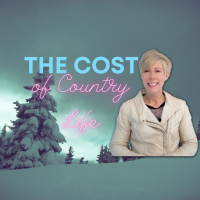Have you decided you would love to move to the country, BUT, you are also concerned about the extra costs to consider when moving to a rural home?
Well, stop stressing!
In this blog post, I outline the most common extra expenses that living in the country entails, so that you can get back to your country home search knowing that your budget makes sense!
Be sure to read to the very end of the post, where I share with you one of my biggest budgeting tips that will help make extra seasonal expenses MUCH more manageable!
Costs to Consider When Moving to a Rural Home:
Heat & Hydro: Cost #1
One of the most common extra expenses of rural life, and particularly in the Thunder Bay area, is that of heating and hydro.
Many of the rural homes that come up for sale, particularly those with larger acreages, are generally older homes that require updating to increase their energy efficiency. They are generally situated in areas where there is not access to natural gas or municipal hydro. This means that home owners are responsible for the purchase, delivery, and storage of heating fuel.
I can tell you from personal experience that when the propane truck pulls out of the driveway, it can feel like your retirement savings are leaving with it!
In terms of hydro, rural home owners are responsible for the maintenance or replacement of poles on their property. I have found in the last few years that rural hydro outages can take longer to resolve. Prudent home owners may want to invest in a back up generator for such occasions.
Rural Hydro Rates are also generally pricier than municipal hydro rates.
Home Insurance Rates: Cost #2
With the use of alternative heating sources, such as wood or oil, increased home insurance rates are typical. I have generally found that rates definitely vary depending on which insurance company you contact.
Water and Sewer: Cost #3
Living on a well and septic system also means that you really need to budget for maintenance, repairs, or even replacement should something go wrong with your system. Water and Septic issues can be a total nightmare, particularly if you don’t have the funds to correct the issue.
Vehicle Maintenance: Cost #4
Costs associated with extra vehicle maintenance are also something to consider. With longer commutes, sometimes on gravel roads, wear and tear as well as quicker vehicle depreciation are both considerations. These days, the increased cost of fuel is also a definite consideration!
Equipment: Cost #5
You will want to ensure that you have the equipment to deal efficiently with snow removal and yard maintenance. Long driveways and large grassy acreages make for tedious work if tackled with a snowblower or traditional lawn mower. Sometimes you can negotiate these things into a purchase. It really depends on not only market conditions but also on any plans that the Seller has already committed to.
Internet Speeds: Cost #6
One of the things that has come more to the forefront in the recent years of COVID, is rural internet speeds. I had tried every provider available to my rural Thunder Bay Area and the speeds were TERRIBLE. With so many people working from home, and kids being home schooled, rural homeowners are paying substantially more to have good internet speeds. I have recently started using Starlink, which by FAR has been the best option so far.
Moving to a Rural Home Budgeting- Pro Tip:
Here is one important tip that I have learned over the years to help soften peak seasonal expense! Average out annual expenses in these categories and pay those utility companies in advance on a monthly basis so that you aren’t stuck with one big bill at the start of the season. This is particularly helpful if you aren’t great at setting money aside for these specific purposes.
What are your biggest budgeting concerns when it comes to moving to a rural home? Have I missed anything? Leave a comment in the comment section with your thoughts- I’d love to hear from you!
If you would like to have a more in depth conversation about moving to the country, definitely reach out, I’m more than happy to help!
If you found this post interesting, you might also be interested in this post:
Living in the Country; What I LOVE and HATE
OR


Moving to a rural home often comes with unique expenses, I am enlightened to know them. Could you provide examples of the extra costs discussed in the article that individuals should consider when relocating to a rural area?